Report
The 23rd World Association on Disaster and Emergency Medicine (WADEM) Biennial Congress, Tokyo, 2-6 May 2025
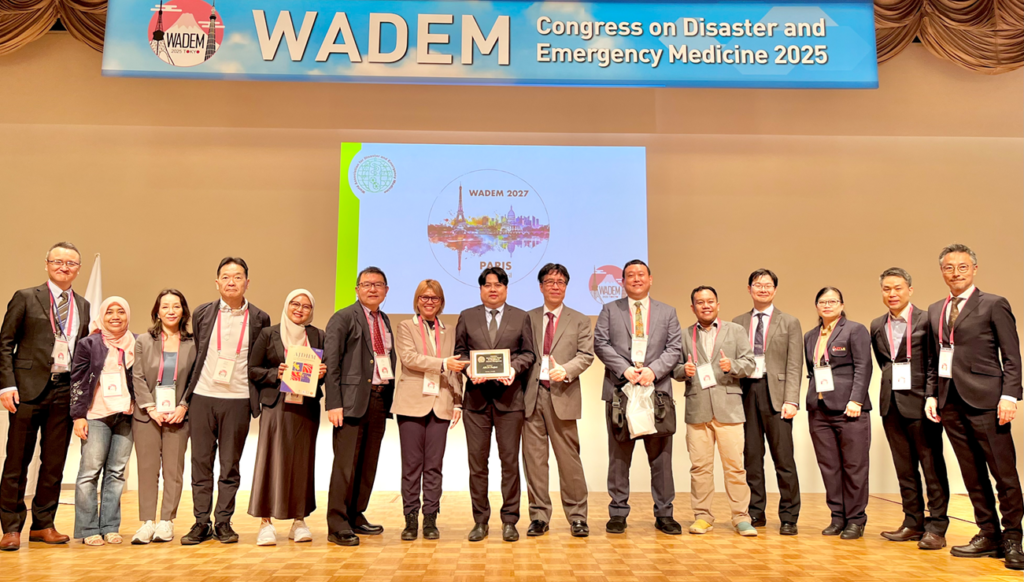
Doc. AIDHM: ARCH Project, AIDHM, RCCDHM, and Japan-ASEAN colleagues during the closing ceremony of the WADEM Congress, after receiving the award for their dedicated efforts in enhancing disaster health management activities in the region.
For one extraordinary week in early May 2025, the vibrant heart of Tokyo became the epicenter of global conversations on disaster and emergency medicine. Professionals, researchers, policymakers, and frontline responders from across continents gathered at the Keio Plaza Hotel, Tokyo for the 23rd World Association for Disaster and Emergency Medicine (WADEM) Congress. Co-hosted by the World Association for Disaster and Emergency Medicine (WADEM) and the Japanese Association for Disaster Medicine (JADM), the congress offered something for every participant: groundbreaking science, hard-won field lessons, heartfelt reunions, and exciting new opportunities for collaboration.
Here is our day-by-day story from WADEM Tokyo 2025:
Report Day 0: Friday, 2 May 2025
The 23rd World Association on Disaster and Emergency Medicine (WADEM) Biennial Congress, Tokyo, 2-6 May 2025
Reported by: Maryami & Madelina
Pre-Congress: A Warm-Up Full of Surprises

Doc. AIDHM: Table groups, with each participant working on their own research canvas
The congress had not yet officially commenced, but excitement was already brewing in the halls of the Keio Plaza Hotel. Pre-congress workshops kicked off with an impressive lineup of sessions. Among them, The Research Design Canvas Workshop for Health Emergency and Disaster Risk Management, co-hosted by the University of Alberta, WHO Kobe Centre, and WADEM emerged as a standout. Participants, including delegates from AIDHM, described the experience as “beyond expectations” – ranging from crafting research objectives and background to developing comprehensive research protocols under the guidance of global experts such as Dr. Jeffrey Franc (University of Alberta; Prehospital and Disaster Medicine), Dr. Ryoma Kayano (WHO Kobe Centre), Prof. Virginia Murray (UK Health Security Agency), Dr. Qudsia Huda (Head of Disaster Risk Management and Resilience Unit in the Health Emergency Program of WHO), Prof. Paul Barach (Thomas Jefferson University), Prof. Tatsuhiko Kubo (Hiroshima University), Prof. Sae Ochi (The Jikei University School of Medicine) et all. The workshop provided invaluable insights into designing impactful research that can shape disaster preparedness and response efforts worldwide.

Doc. AIDHM: participants in Infectious Diseases workshop
The energy did not falter there. In other rooms, experts such as Dr. Vijai Bhola, Dr. Rajeev Fernando, and Dr. Gavin Harris discussed emerging infectious diseases, forecasting, the effect of climate change, challenges in global travel medicine, and biological attack risk during the Infectious Diseases for the Disaster Medicine Professional Workshop. In a separate workshop, Dr. Caren Friend, Dr. Alison Hutton, and Dr. Marc-Antoine Pigeon, Kaitlyn Watson also guided the primary care professional fusing primary care and mass gathering medicine with tabletop exercises (TTx) . Meanwhile, Dr. Ryan Hata, Richard Staynings, and Dr. Christian Dameff led riveting discussions and simulations on digital threats in healthcare in 50 minutes round robin presentation Safeguarding Health Care: A Prescription for Securing Medicine’s Digital Frontier. The day ended with a sense of accomplishment—and the anticipation of more to come.

Doc. AIDHM: WADEM Welcoming Party
The WADEM welcoming party was a vibrant celebration that brought together attendees from around the world to kick off the congress in a warm and festive atmosphere. The evening featured a captivating performance of traditional Japanese music, enchanting the audience with its melodic tunes and cultural richness. Guests enjoyed engaging conversations and heartfelt reunions with old colleagues, sharing experiences and reconnecting after years apart. It was also an excellent opportunity to meet new colleagues from diverse backgrounds, fostering new collaborations and friendships. Delicious local cuisine and a variety of snacks complemented the convivial mood, providing a perfect setting for networking and celebrating the spirit of international cooperation and shared dedication to disaster and emergency medicine.
Report Day 1: Saturday, 3 May 2025
The 23rd World Association on Disaster and Emergency Medicine (WADEM) Biennial Congress, Tokyo, 2-6 May 2025
Reported by: Maryami & Madelina
Opening with Heart and Hope
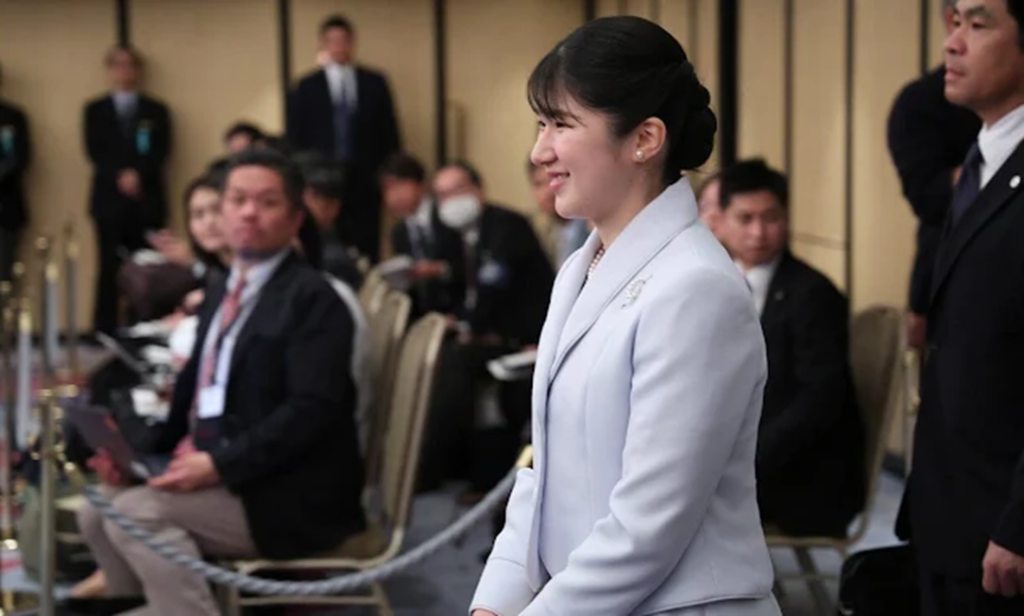
Source: newmyroyal.com officially website : Princess Aiko in the opening ceremony of WADEM Congress
The official opening was nothing short of regal. Her Imperial Highness Princess Aiko welcomed delegates from around the world with a reflection on Japan’s commitment to disaster preparedness. Princess Aiko emphasized the increasing frequency and severity of disasters around the world, saying, “The importance of disaster medicine and emergency medicine is greater than ever.” She added that the congress “will be a meaningful opportunity to pass on your rich experiences and knowledge to the younger generations who will lead the future.
WADEM President Professor Donald A. Donahue, WADEM 2025 Committee Chair Professor Yasuhiro Otomo, Tokyo Governor Yuriko Koike, and Japan’s Vice Minister of Science and Technology collectively took the stage to convey their warm congratulations and encouragement to all participants. They expressed their joy in welcoming attendees from across the globe and highlighted the shared commitment to advancing disaster and emergency medicine. The leaders emphasized the vital importance of international collaboration, knowledge exchange, and innovation in addressing complex crisis situations. With over 1100 participants representing 82 countries, this gathering exemplified a global spirit of unity and dedication to improving practices and strengthening resilience. They inspired everyone present with a message of hope and determination to foster a safer, more prepared world through continuous learning, cooperation, and shared expertise in disaster and emergency medicine.

Doc. AIDHM: Group photo taken after the ARCH
session
Later in the day, The Project for Strengthening The ASEAN Regional Capacity on Disaster Health Management (the ARCH Project) marked a significant milestone—its 10-year anniversary—with a special panel discussion moderated by Professor Tatsuhiko Kubo and Dr. Tomoaki Natsukawa. The session featured distinguished speakers, including Dr. Phumin Silapunt, Chief of the Thai Taskforce for the ARCH Project; Dr. Tatsuro Kai and Dr. Natsukawa from the Japanese Advisory Committee; and Dr. Kriangsak from the Ministry of Health Thailand and Chair of the Regional Coordination Committee for Disaster Health Management (RCCDHM). Their reflections on ASEAN-wide capacity building were both deeply personal and visionary, highlighting the project’s impact over the past decade and inspiring future efforts to strengthen disaster health management across the region. The discussion not only celebrated achievements but also envisioned new horizons for regional collaboration and resilience
Report Day 2: Sunday, 4 May 2025
The 23rd World Association on Disaster and Emergency Medicine (WADEM) Biennial Congress, Tokyo, 2-6 May 2025
Reported by: Maryami & Madelina
Posters, Partners, and Possibilities

Doc. AIDHM: Lunch Meeting Discussion
By Sunday, the congress was in full swing, with participants actively engaging in a lively exchange of ideas and experiences. Over five topics were running simultaneously, featuring oral and lightning presentations that showcased a diverse range of cutting-edge research and innovative practices.
During the lunch break, the AIDHM and ARCH Project teams convened a special lunch meeting with key partners, including Professor Sean T. Casey, Director of the WHO Western Pacific Regional Office, and Dr. Flavio Salio, Director of Emergency Medical Teams at WHO Headquarters. This important gathering provided an invaluable opportunity to explore collaborative strategies for strengthening disaster research capacity across ASEAN. Attendees shared best practices, innovative approaches, and practical experiences aimed at enhancing academic activities among medical practitioners, emergency responders, and disaster management professionals. The dialogue emphasized the importance of regional cooperation, capacity building, and knowledge sharing to improve disaster resilience and response effectiveness. The discussions were both forward-looking and focused on tangible actions, fostering a spirit of partnership that could lead to impactful initiatives in the near future. This productive meeting not only highlighted the strong commitment of all parties involved but also set a positive tone for continued collaboration and progress in disaster medicine and research across the region.

Doc. AIDHM: Poster of ASEAN Journal of Disaster Health Management
Later, during the poster session, the AIDHM team proudly unveiled their vision for the ASEAN Journal of Disaster Health Management (AJDHM), positioning it as a key platform for nurturing emerging voices in disaster research. Their compelling poster titled “Advancing Disaster Health Knowledge Management: The Role and Future Vision of ASEAN Journal of Disaster Health Management (AJDHM)” captured the attention of attendees and ignited meaningful conversations about the journal’s potential to foster innovation and collaboration within the region. The social hour that followed was a vibrant gathering, where participants connected over posters, enjoyed drinks, and engaged in lively discussions that extended well into the evening, further strengthening the sense of community and shared commitment to advancing disaster health research in Southeast Asia.
Report Day 3: Monday, 5 May 2025
The 23rd World Association on Disaster and Emergency Medicine (WADEM) Biennial Congress, Tokyo, 2-6 May 2025
Reported by: Maryami & Madelina
ASEAN Academic Network on Disaster Health Management (AANDHM) Session

Doc. AIDHM: All esteemed speakers at the AANDHM session, WADEM Congress
As a continuation of our series of special sessions at the WADEM Congress, Japan, ASEAN Institute for Disaster Health Management (AIDHM) and related colleagues once again collaborated to deliver a seminar focused on advancing disaster health management (DHM). Building upon previous discussions, the session revisited the history, lessons learned, and future directions of the ARCH project, which has played a vital role in supporting and strengthening DHM activities across ASEAN for more than a decade. Today seminar also emphasized the importance of the academic network approach as a means to further enhance regional collaboration, capacity building, and knowledge sharing among ASEAN member states.
The highlight of this series was the second ASEAN session, titled “ASEAN Academic Network on Disaster Health Management (AANDHM),” held at Eminence Hall (5F) of the Keio Plaza Hotel on Monday, May 5, 2025. From 14:00 to 15:30, the session provided a
platform for prominent academic leaders, government officials, and subject matter experts from ASEAN and beyond to exchange insights, discuss strategic initiatives, and explore innovative approaches for advancing DHM capabilities. the session gathered leading academic leaders and experts to exchange insights and discuss strategic approaches for strengthening disaster health management capabilities across Southeast Asia and the broader region.
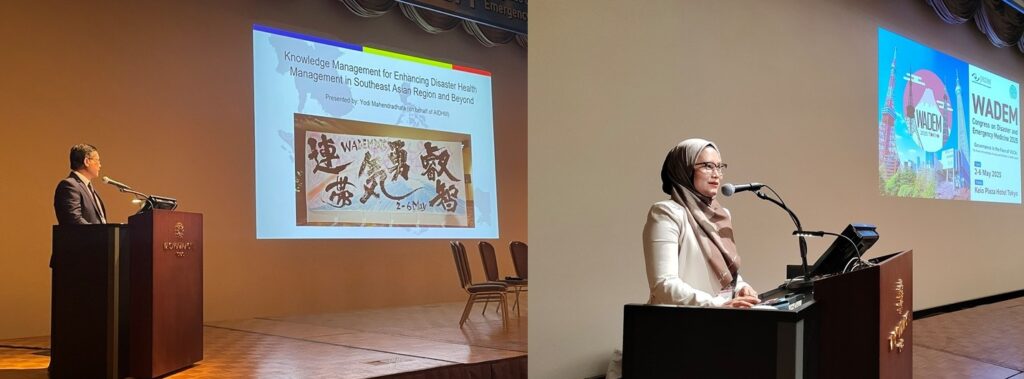
Doc. AIDHM : (left) Prof. Yodi Mahendrdhata, (Right) Dr. Maryami Yuliana
The session opened with a keynote presentation by Professor Yodi Mahendradhata, The Head of the ASEAN Institute for Disaster Health Management (AIDHM), Editor in Chief of ASEAN Journal of Disaster Health Management (AJDHM), and Dean of Faculty of Medicine, Public Health and Nursing (FoM-PHN), Universitas Gadjah Mada (UGM) representing the AIDHM, titled “The Significance of the ASEAN Academic Network on Disaster Health Management: Strategic Approaches to Strengthening Academic Capacity among Disaster Management Programs in the ASEAN Region and Beyond.” Yodi emphasized the pivotal role of AANDHM in promoting academic collaboration, facilitating knowledge management, and operationalizing the Plan of Action to implement the ASEAN Leaders Declaration on DHM (2019–2025). He also highlighted AIDHM’s core activities, including regional research initiatives, training centers, and the launch of AJDHM to support publication efforts among early-career ASEAN researchers.
Following this, Dr. Maryami Yuliana Kosim, RN, Ph.D., Coordinator of Research, Development, and Information Sharing Division AIDHM, also from Universitas Gadjah Mada, delivered a presentation titled “Addressing Research Challenges in ASEAN: Strengthening Academic Capacity through Joint Research” as part of the ASEAN joint research’s update. Maryami shared insights from the ARCH-Project’s ASEAN Joint Research initiative and presented key findings from a preliminary survey on Institutional Review Board/Ethics Committee (IRB/EC) processes across ASEAN. She underscored the complexities of multi-country research, including delays due to varied ethical clearance procedures and a lack of cross-border recognition. Her presentation called for the establishment of joint facilitation mechanisms and harmonized research protocols across the region.
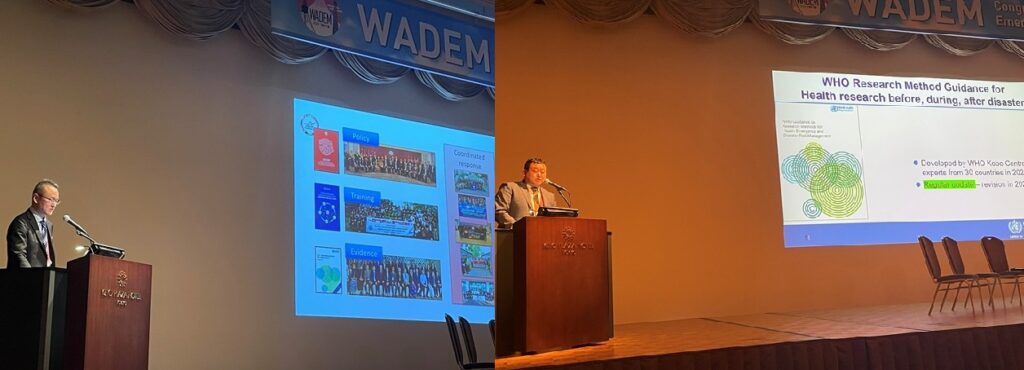 Doc. AIDHM : (left) Prof. Tatsuhiko Kubo, (Right) Dr. Ryoma Kayano
Doc. AIDHM : (left) Prof. Tatsuhiko Kubo, (Right) Dr. Ryoma Kayano
The session proceeded with valuable insights from Professor Tatsuhiko Kubo of Hiroshima University and the Japanese Association for Disaster Medicine (JADM). He addressed the critical challenges associated with data collection during disaster situations, emphasizing the importance of establishing standardized protocols to improve data reliability, comparability, and timeliness. His discussion underscored how harmonized data can enhance decision-making and coordination in emergency responses, ultimately saving lives and resources.
Following Professor Kubo’s presentation, Dr. Ryoma Kayano from the WHO Centre for Health Development in Kobe, Japan (WHO Kobe Centre), delved into WHO’s comprehensive methodological guidance for conducting health research across the different phases of emergencies—before, during, and after disasters. He outlined the key principles and best practices for designing and implementing health research in crisis settings, highlighting how such evidence can inform policy, strengthen health systems, and improve disaster preparedness and response. Dr. Kayano stressed the importance of multidisciplinary collaboration and community engagement in generating meaningful data that accurately reflect the health needs of affected populations.

Doc. AIDHM: Prof. Jeffrey Franc
The session concluded with Professor Jeffrey Franc, Editor-in-Chief of Prehospital and Disaster Medicine (PDM), who shared valuable editorial insights and practical tips for authors seeking to publish disaster health-related research. He provided guidance on selecting appropriate journals, preparing high-quality manuscripts, and navigating the peer review process. Professor Franc also emphasized the importance of clear and concise scientific communication, adherence to ethical standards, and the importance of contributing impactful research that addresses real-world challenges in disaster medicine. His advice aimed to empower researchers and practitioners to enhance the quality and visibility of their work, ultimately advancing the field of disaster health through rigorous scholarly publication.

Doc. AIDHM: Discussion Session led by Prof. Egawa (right) and Dr. Ryoma
The session concluded with an engaging panel discussion chaired by Dr. Ryoma Kayano and Professor Shinichi Egawa from Tohoku University. The discussion actively involved the audience, including representatives from the ARCH Project and Professor Donald A. Donahue, President of WADEM. Participants shared valuable insights on future directions for academic collaboration and disaster health research across the ASEAN region, while also addressing the challenges in strengthening partnerships from both sides—disaster field practitioners and disaster researchers. These challenges include bridging gaps in communication, aligning research priorities with practical needs, and fostering mutual understanding and trust. The AANDHM special session exemplified a strong shared commitment to advancing collaborative scholarly efforts, enhancing research infrastructure, and fostering resilient health systems across ASEAN and beyond. Collectively, these initiatives underscore the region’s dedication to improving disaster preparedness and response through innovative, research-driven solutions that effectively integrate field experiences with scientific research.
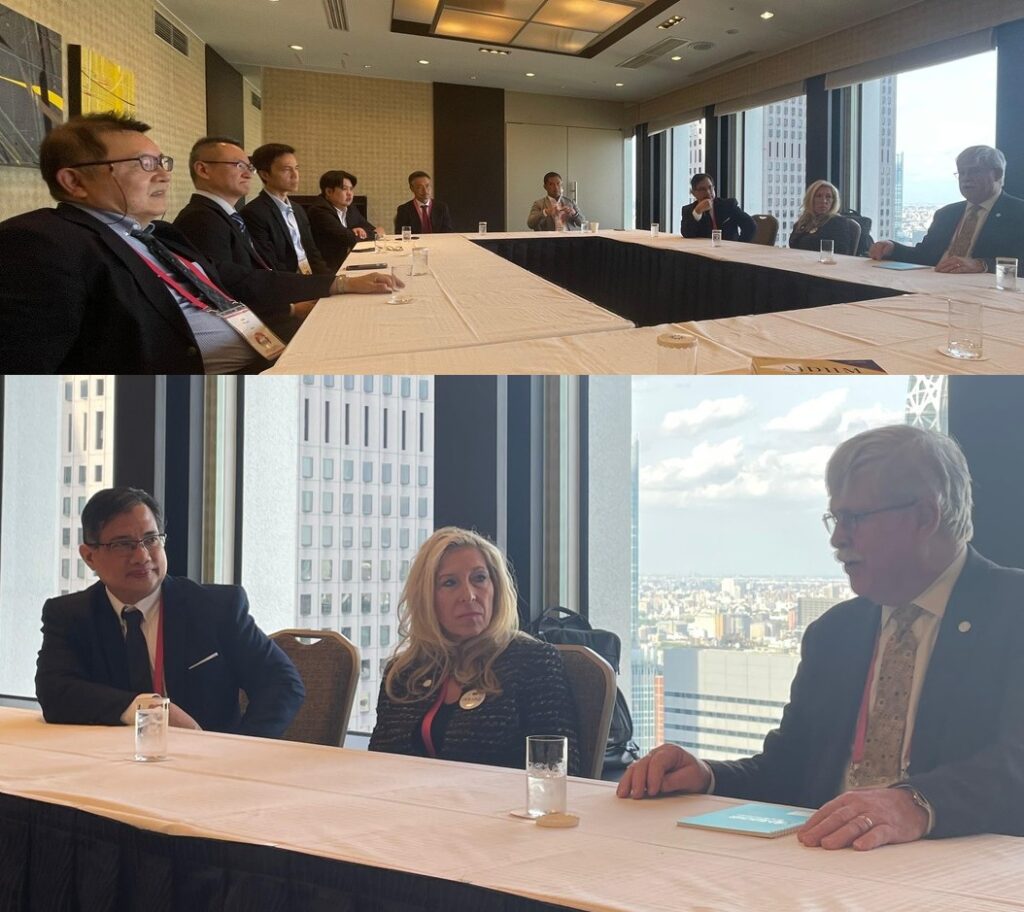

Doc. AIDHM: Special meeting with the President of WADEM
Soon after the session, during the 45-minute networking break, representatives from AIDHM, RCCDHM, and the ARCH Project seized the opportunity to meet with WADEM President Professor Donald A. Donahue and his wife, Evelyn A. Donahue. Led by Professor Yodi Mahendradhata, the informal yet meaningful discussion explored potential avenues for collaboration between AANDHM and WADEM—especially in strengthening research capacity in disaster health management and fostering the continued development of the ASEAN Journal of Disaster Health Management (AJDHM). The exchange was highly promising, characterized by mutual enthusiasm and forward-looking ideas that underscored a shared commitment to advancing disaster health research and regional cooperation.
Later that afternoon, Dr. Maryami returned to the stage to deliver a second ASEAN Joint research preliminary finding oral presentation. Her talk, titled “Safe Hospital Tools Diversity in ASEAN: A Scoping Review,” sparked thoughtful discussion on how hospital safety tools are being adapted to fit diverse local contexts across the region.
Report Day 4: Tuesday, 6 May 2025
The 23rd World Association on Disaster and Emergency Medicine (WADEM) Biennial Congress, Tokyo, 2-6 May 2025
Reported by: Maryami & Madelina
A Graceful Goodbye
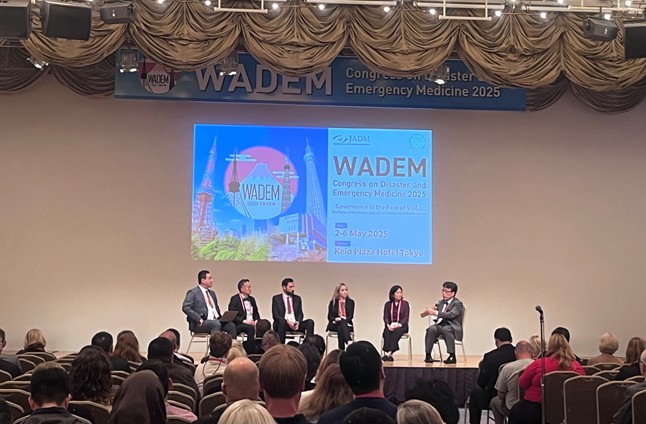
Doc. AIDHM: Closing panel session of WADEM Congress 2025
The final morning of WADEM Tokyo 2025 opened with a plenary session that balanced both grounded insight and and visionary perspective. Held in the elegant Eminence Hall, the Closing Plenary (9:00–11:00, Tuesday, 6 May 2025) was chaired by Professor Shinichi Egawa, who set a thoughtful and reflective tone for the congress’s concluding discussions. The session began with Dr. April Llaneta from the University of the Philippines–Philippine General Hospital, delivering a powerful presentation on Business Continuity Plan: Emergency Care in the Time of Crisis. Next, Dr. Elizabeth Newnham of Curtin University in Australia shifted the focus to a longer timeline, presenting on Long-term Mental Health Trajectories after Disasters and Pandemics. From there, the discussion took on a global scope. Dr. Luca Pigozzi, representing the WHO EMT Initiative, offered a sobering yet inspiring presentation on EMT Coordination in the Gaza Humanitarian Crisis. Finally, Dr. Masahiro Morikawa from the University of Virginia brought the discussion back to the everyday heroes of disaster response: primary care providers. The session concluded with a lively panel discussion and audience Q&A, drawing out shared concerns, differing approaches, and a collective ambition to continue improving health system resilience around the world. It was a fitting close to four days of learning, networking, and renewed commitment to disaster health management.

Doc. AIDHM: (from left) Suichi Ikeda from ARCH Project, Dr Bella Donna from AIDHM, Dr Kriangsak from RCCDHM, and Prof Don as the President of WADEM
As the final plenary drew to a close, participants made their way into the Awards & Closing Ceremony, an uplifting finale led by WADEM President, Professor Donald A. Donahue. Held in the spirit of gratitude and celebration, this biennial tradition honors the individuals and organizations who have made outstanding contributions to the fields of disaster medicine, emergency management, and humanitarian health. This year, one of the highlights of the ceremony was the formal recognition of The Project for Strengthening The ASEAN Regional Capacity on Disaster Health Management (the ARCH Project), which received a special award from WADEM for its decade-long commitment to strengthening Disaster Health Management (DHM) capacity across the ASEAN region. The acknowledgment reflected not only the scale of ARCH’s impact—but also the spirit of regional collaboration it fostered among ministries of health, academic institutions, and international partners.

Doc. AIDHM: Symbolic handover of the WADEM flag from Japan to France
The mood then turned festive as Evelyn A. Donahue joined her husband on stage to host the much-anticipated WADEM Passport Prize Draw. Throughout the congress, participants had been collecting stamps by visiting each booth in the exhibition area—and now it was time to reap the rewards. Laughter and cheers filled the room as lucky winners walked away with a range of exciting prizes: official WADEM souvenirs, elegant bottles of Japanese sake, and for a few fortunate names—an Apple iPad. It was a perfect blend of fun and festivity, wrapping up the congress on a high note.
As delegates embraced, took last-minute selfies, and exchanged contact details, it was clear: WADEM Tokyo 2025 had not only advanced the science of disaster health but strengthened the global community that drives it forward. As the curtains closed, there were smiles, hugs, and promises to meet again. See you in WADEM Paris 2027.
—end—